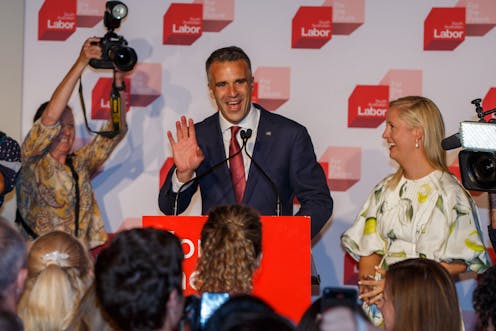
With 54% of enrolled voters counted in Saturday’s South Australian election, the ABC is calling Labor wins in 25 of the 47 seats, enough for a three-seat majority. The Liberals have won nine seats and independents four. The current final results prediction is Labor 28, Liberals 14 and independents five.
Vote shares are 40.4% Labor (up 7.7% since the 2018 election), 34.6% Liberals (down 3.4%), 9.6% Greens (up 2.9%), 3.8% Family First (up 0.8%), 2.7% One Nation and 8.7% for all Others – mainly independents (up 3.3%). The big crash was Nick Xenophon’s former SA-Best, which was down 14.0% to just 0.2%.
Labor gained the four very marginal Liberal seats of Adelaide, Elder, King and Newland, which were all held by 2% or less. They also gained Davenport, which the Liberals held by an 8.1% margin. The Liberals lost Stuart to independent Geoff Brock, who had contested this seat after his political base was moved out of Frome in a redistribution.
Votes counted so far include only those cast on election day in home electorates. A large number of pre-poll, postal and election day absent votes remain to be counted; this will occur next week. Postal votes nearly always favour the Liberals strongly relative to other votes in Australia, while the smaller numbers of absent votes favour Labor.
The Liberals have many seats where they are currently just ahead, but are likely to extend their leads in those seats once all votes are counted. A Labor win in Gibson, where they currently lead by 51.6-48.4, is more doubtful.
Analyst Kevin Bonham has a discussion of messy seats. In Finniss, the Liberals are well ahead on primaries, with independent Lou Nicholson just behind Labor. If Nicholson maintains her current position in the remaining vote, she probably passes Labor on minor party preferences, and goes on to win Finniss.
In Waite, Labor is just ahead of the Liberals on primary votes with 27.4% to 24.5%. Liberal MP turned independent Sam Duluk is on 18.9%, another independent on 15.3% and the Greens 12.0%. While it’s possible one independent makes the final two, it’s more likely this is a Labor vs Liberal contest. The electoral commission needs to re-do its two candidate count so it’s between the Liberals and Labor.
Federal implications and poll performance
After 16 years of Labor government in SA from 2002-18, the Liberals were defeated after a single term. The federal government’s unpopularity will be blamed for the state Liberal loss, and it will be seen as a pointer to the federal election expected in May.
We already know from the federal polling, such as the last Newspoll that gave Labor a 55-45 lead, that the federal government is currently in trouble. What matters from a federal election perspective is not the SA result, but what happens in federal polling between now and the election. It’s unlikely, but still possible, that the government recovers by the election.
The final SA state Newspoll had Labor winning by 54-46 from primary votes of 41% Labor, 38% Liberals, 9% Greens and 12% Others. A YouGov poll had Labor winning by 56-44, from primary votes of 41% Labor, 33% Liberals, 11% Greens and 15% Others. While both polls were conducted by the same company, they were not the same due to different weighting – see this Poll Bludger post.
When all votes are counted, the Liberals are likely to finish between the 33% and 38% these two polls gave them, with Labor below the 41% both polls had and the Greens on 9%, close to Newspoll. Although Newspoll was likely more accurate, both polls did reasonably well.
The worst poll catastrophe was an early February seat poll for Stuart from uComms, reported by The Poll Bludger, that gave Brock just 11.3% of the primary vote; he’s currently on 48.5%!
Read more: As South Australians head to the polls, Labor is favourite but there are many unknowns
Upper house could be poor result for Labor
Eleven of the 22 upper house seats were up for election. SA uses statewide proportional representation with optional above the line preferential voting. A quota is one-twelfth of the vote, or 8.3%.
With 53% of enrolled voters counted for the upper house, Labor had 4.45 quotas, the Liberals 3.97, the Greens 1.18, One Nation 0.50, the Liberal Democrats 0.42, Family First 0.39, Legalise Cannabis 0.27 and Animal Justice 0.18.
Four Labor, four Liberals and one Green will be elected. One Nation is likely to win one seat, but the big question is Labor. On current counting, Labor would win a fifth upper house seat, but the danger is that their vote slides in late counting, putting their surplus after four quotas behind the Lib Dems and Family First.
In this case, Labor will need preferences from the Greens, Legalise Cannabis and Animal Justice to overcome a deficit. But above the line preferencing is optional in SA.
Despite Labor’s thumping victory in the lower house, there is some chance that the upper house is 6-5 to right-wing parties with One Nation and either the Lib Dems or Family First joining four Liberals.
Even if Labor wins the last seat, Labor and the Greens would not control the upper house as the 11 members elected in 2018 are not up until 2026. These members are four Liberals, four Labor, two SA-Best and one Green. SA-Best won just 0.13 quotas, so their two members elected in 2018 are very unlikely to survive 2026.
Adrian Beaumont does not work for, consult, own shares in or receive funding from any company or organisation that would benefit from this article, and has disclosed no relevant affiliations beyond their academic appointment.
This article was originally published on The Conversation. Read the original article.







